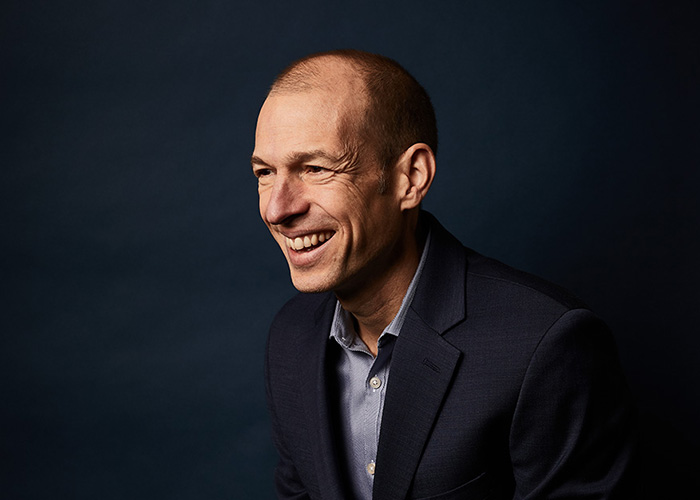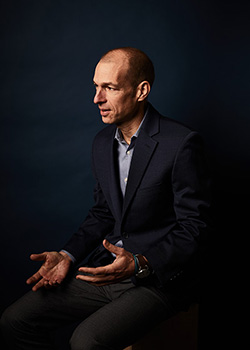Follow My Lead: Anthony DeSimone, PhD
By Jacob Harte
 Photo by Jared Castaldi
Photo by Jared Castaldi
January 24, 2019
BS Physics ’98, MS Physics ’01, PhD Physics ’05
Vice President and Chief Engineer,
Integrated Warfare Systems & Sensors Division,
Lockheed Martin
No matter the day or season, Anthony DeSimone’s mornings start the same: a 4 a.m. wakeup and quick email check, followed by a one- to three-hour run. The discipline required to maintain these morning rituals weaves its way through every aspect of DeSimone’s life, allowing him to tackle the pressures of leading more than 2,000 engineers and a unit that brings in $5 billion in revenue annually.
Recognized within the missile defense community as a subject matter expert for ballistic missile defense and radar discrimination, DeSimone takes pride in supporting the next generation of scientists, often speaking at universities in the region. These interactions are a source of inspiration for his own work, and provide an opportunity to share what he’s learned along the way — lessons that transcend industries and lay the groundwork for effective leadership.
Lesson One
Everything in life is about setting priorities and managing risk.
After graduating from college with a degree in music, DeSimone had every intention of becoming a musician. But when his priorities shifted to family, he decided that studying physics at Drexel would provide more of the stability he needed. Many would consider it a daunting career shift, but DeSimone saw an opportunity.
“Any time you make a big change, walk into the unknown, you have to face yourself, as well as what you are setting out to accomplish,” says DeSimone.
“At work and in my personal life, I have a set of priorities, a road map of where I want to go. It doesn’t always work out, but it allows me to manage my life in a particular way.”
“Sometimes you have to make sacrifices, but when you know what you want and base your lifestyle around that, everything else falls into place.”
Number of Vacation Days I Took Last Year:
At least 2 weeks, plus holidays
My First Job:
Paperboy for the Philadelphia Bulletin
Going the Extra Mile:
I once ran 53.5 miles in one day for charity.
Lesson Two
A bad decision is better than no decision.
With his background in the arts, DeSimone is familiar with the criticism that can lead to self-doubt.
“I’ve seen ‘analysis paralysis’ hold some managers back from being great leaders: You need to amalgamate all the information at your disposal and decide where you want to go — sometimes that means making a decision with only 80 percent of the data,” says DeSimone.
“I grew up with this philosophy: There are good decisions, there are bad decisions, and there are no decisions. And it’s in that order. It’s better to make a bad decision than to make none. Without a decision, your team is wandering around doing nothing, when they could be learning and growing.”
Lesson Three
Embrace teamwork.
DeSimone’s team knows that at the end of the day, he’s the one who has to make the final decision. But, more importantly, he says, they know they each have a voice at the table.
“As a leader, you have to realize that you won’t always be the smartest person in the room — there are going to be people who are much smarter than you in different areas,” DeSimone says. “You have to be open-minded, listen, and understand that your intuition may not be right. A strong leader knows when it’s time to say, ‘I was wrong; we need to change course.’”

Lesson Four
Give your employees room to fail.
When you’re making the transition from being an individual contributor to a leader, it’s common to feel like you’re losing control, says DeSimone. But delegating is about shifting your perspective on what you control.
“A lot of people I mentor struggle with delegating. I struggled with it at first. But I don’t have the bandwidth to micromanage every situation. Learning to delegate and hold people accountable gives me a sense of accomplishment, as opposed to being someone who just knows how to get stuff done. You have to set the expectations and let your employees fail or succeed. That’s how everyone learns,” says DeSimone.
Lesson Five
Listen and empathize.
With the responsibility of overseeing such a large department, DeSimone’s time is understandably limited. But, he says, making time for your employees is crucial for them and for the organization.
“As the vice president of a company, I understand that people spend a lot of time and effort to get a half-hour meeting with me. I try to schedule two to three one-on-ones a day,” says DeSimone.
“When your employees come for that time, you’ve got to be an avid listener. You’ve got to be responsive, and you’ve got to show empathy. I think it’s a quality that makes a good leader great. It’s hard. For me, it’s damn hard. I’m naturally introverted, but I’ve realized how important it is. It’s disrespectful not to give your employees the time that they deserve.”
Lesson Six
Maintain a wonder for the world.
DeSimone finds a great sense of accomplishment in acquiring a better understanding of the world, whether it’s the physics behind a phenomenon or tricks for becoming a better runner.
“I’m a ferocious reader. I read books, news articles, all the time. I try and get as much information as I can, because I think you need to absorb and integrate all that information to decide where you want to go,” DeSimone says.
“Know where you want to be in a few years, find people who exhibit the skills you need to get there, and go spend some time with them. No one can make your career happen, but knowing what to expect certainly helps.”
* This article originally appeared in the College of Arts and Sciences' Ask magazine feature story, “Follow my Lead.” For more Ask stories, visit askmagazine.org.